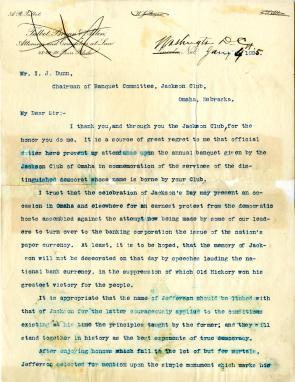William Jennings Bryan and the ideals of the Declaration of Independence, 1895
A Spotlight on a Primary Source by William Jennings Bryan
 In 1895, Williams Jennings Bryan wrote to I. J. Dunn, an Omaha lawyer and president of the Jackson Club, to decline an invitation to speak at the local Jefferson-Jackson Day dinner, an annual event held by the Democratic Party. Bryan, a politician from Nebraska, was already a national political figure who had served two terms in the House of Representatives (1890 and 1892) and would win the Democratic nomination for president of the United States in 1896. His letter expresses his political beliefs and draws upon the ideals of Andrew Jackson and Thomas Jefferson.
In 1895, Williams Jennings Bryan wrote to I. J. Dunn, an Omaha lawyer and president of the Jackson Club, to decline an invitation to speak at the local Jefferson-Jackson Day dinner, an annual event held by the Democratic Party. Bryan, a politician from Nebraska, was already a national political figure who had served two terms in the House of Representatives (1890 and 1892) and would win the Democratic nomination for president of the United States in 1896. His letter expresses his political beliefs and draws upon the ideals of Andrew Jackson and Thomas Jefferson.
Bryan compared contemporary events in business and banking to Jackson’s destruction of the Bank of the United States and then concentrated on Jefferson’s statement in the Declaration of Independence that “all men are created equal”:
Of the self-evident truths set forth in that immortal document the declaration that “All men are created equal” is the most important because it is the most fundamental and comprehends all the others. Its application now would solve aright the questions which vex the civilized world, and would both remove the abuses of legislative power encouraged by our own government and add to the laws we now have such additional statues as are necessary to protect each citizen in the enjoyment of life, liberty and the pursuit of happiness.
Bryan would become the youngest major-party presidential candidate when he earned the Democratic and Populist nominations in 1896 at the age of thirty-six, and would run two more times (1900 and 1908). Throughout the rest of his political career, Bryan supported legislation that helped achieve his understanding of Jefferson’s ideals:
- Economic reform: government control of currency and banking, regulations regarding trusts and corporate monopolies, the Federal Reserve Act, the Federal Trade Commission, the Federal Farm Loan Act, tariff reform
- Public policy: government regulation of the railroad and telegraph/telephone as well as safety devices and pure food processing, establishment of departments of health, education and labor, promotion of public parks, defense of rights of minorities, legislation to provide for liberal equal-time consideration of Darwinian evolution and Biblical creationism in the public schools
- Labor reform: workers’ compensation, the minimum wage, the eight-hour day, improved conditions for seamen and railroad employees, prohibition of injunctions in labor disputes
- Political reform: regulation of political campaign contributions, voting reform, public disclosure of newspaper ownership and the signing of editorials, the Sixteenth, Seventeenth, Eighteenth, and Nineteenth Amendments to the Constitution (graduated income tax, direct election of senators, prohibition of liquor, woman suffrage)
- Anti-imperialism
